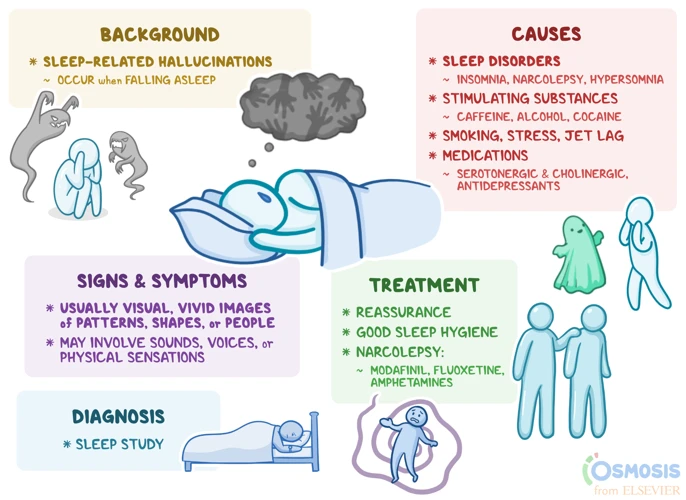Do you sometimes struggle to fall or stay asleep at night? You’re not alone. Insomnia affects millions of people worldwide and can have a significant impact on their daily lives. While some individuals experience occasional bouts of insomnia, others suffer from chronic forms of this sleep disorder. It’s essential to understand the different types of insomnia and their symptoms to seek appropriate treatment. In this article, we’ll take a deep dive into the various forms of insomnia, including acute, chronic, onset, maintenance, comorbid, and psychophysiological. Let’s explore each type to gain a better understanding of this common sleep disorder.
Acute Insomnia
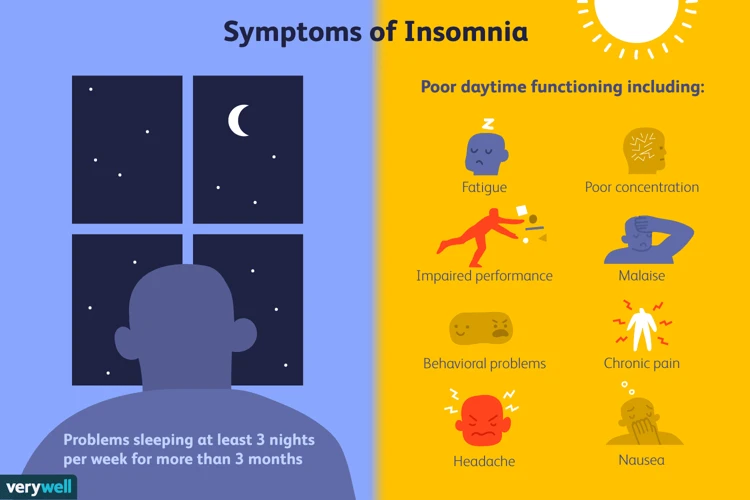
Sleep is essential for our overall health and well-being. However, there are times when we have difficulty falling or staying asleep, which can lead to insomnia. Insomnia is a sleep disorder that affects millions of people worldwide. It can be a short-term or chronic condition that can significantly impact our daily lives. In this section, we will be discussing an insomnia type known as acute insomnia. This type of insomnia can occur due to various factors and often resolves on its own. Let’s dive in and explore its symptoms and treatments.
Symptoms
When it comes to insomnia, there are various symptoms that can indicate which type of insomnia is being experienced. Here are the symptoms for each type:
Acute Insomnia:
- Difficulty falling asleep
- Waking up during the night and having trouble returning to sleep
- Waking up earlier than intended
- Feeling tired upon waking up
- Feeling anxious about sleep
- Experiencing these symptoms for a few nights or up to a few weeks
Chronic Insomnia:
- Difficulty falling asleep
- Waking up during the night and having trouble returning to sleep
- Waking up earlier than intended
- Feeling tired upon waking up
- Experiencing these symptoms at least three nights a week for three months or more
Onset Insomnia:
- Difficulty falling asleep
- Trouble initiating sleep
- Experiencing these symptoms at the beginning of the night
Maintenance Insomnia:
- Waking up during the night and having trouble returning to sleep
- Waking up earlier than intended
- Having trouble staying asleep
- Experiencing these symptoms in the middle of the night or early morning
Comorbid Insomnia:
- Experiencing the symptoms of insomnia alongside another medical or mental health condition
- Feeling the symptoms of insomnia worsen because of the other condition
Psychophysiological Insomnia:
- Experiencing the symptoms of insomnia because of anxiety or tension surrounding sleep
- Difficulty falling asleep
- Waking up during the night and having trouble returning to sleep
- Waking up earlier than intended
It’s important to note that these symptoms are not exclusive to each type of insomnia and can overlap between types. If you’re experiencing any of these symptoms regularly, it’s important to speak with a healthcare professional to get a proper diagnosis and treatment plan.
Treatment
When it comes to treating different types of insomnia, there is no “one size fits all” approach. Treatment may vary depending on the underlying cause and severity of the condition. Here are some treatment options for specific types of insomnia:
- Acute Insomnia: Generally, acute insomnia resolves on its own within a few days or weeks without any specific treatment. However, there are things you can do to manage the symptoms such as:
- Practice good sleep hygiene, such as sticking to a regular sleep schedule, avoiding caffeine and alcohol, and creating a relaxing bedtime routine.
- Limit naps during the day to improve your ability to fall asleep at night.
- Avoid stimulating activities before bedtime such as watching TV or using electronic devices.
- Cognitive-behavioral therapy, which can help identify and change negative thoughts or behaviors that may be leading to insomnia.
- Prescription medications, such as sleeping pills or antidepressants, to help manage symptoms, though these should be used with caution and only under a doctor’s guidance.
- Relaxation therapies such as meditation, yoga, or deep breathing exercises which can help promote relaxation and improve sleep quality.
- Stimulus control therapy, which involves creating an association between the bed and sleep to help train the body for sleep.
- Sleep restriction therapy, which involves limiting the amount of time spent in bed to help improve sleep quality and decrease the time it takes to fall asleep.
- Identifying and treating any underlying medical or mental health conditions that may be contributing to the insomnia.
- Behavioral therapy or counseling to help address any psychological issues that may be contributing to the maintenance insomnia.
- Medications such as benzodiazepines or non-benzodiazepine hypnotics to help manage symptoms, although these should be used with caution and only under a doctor’s guidance.
- Stress reduction techniques, such as meditation, yoga, or deep breathing exercises.
- Cognitive-behavioral therapy to identify and address negative thoughts or behaviors associated with insomnia.
- Prescription medications, such as sleeping pills or a low-dose antidepressant, although these should be used with caution and only under a doctor’s guidance.
Remember, the best treatment for insomnia will depend on the individual and their unique circumstances. It is always recommended to consult with a healthcare professional to determine the best course of action.
Chronic Insomnia
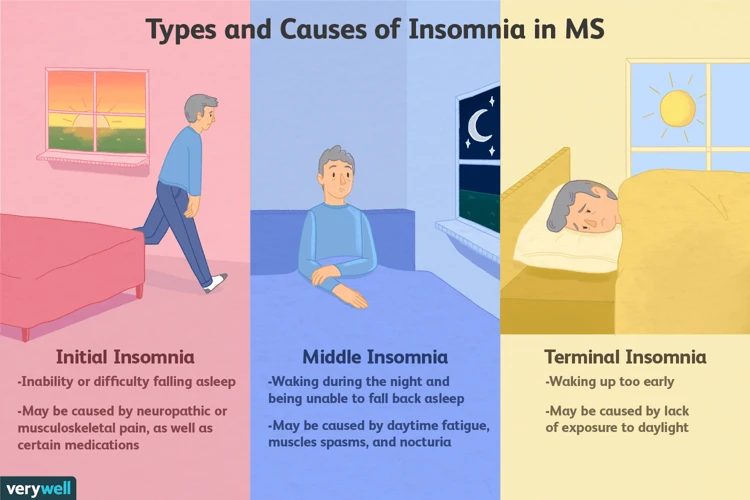
Insomnia is a complex sleep disorder that affects a significant percentage of the population worldwide. Chronic insomnia is one of the most common types of insomnia, characterized by ongoing difficulty falling and staying asleep for at least three nights a week for three months or longer. It can leave individuals feeling fatigued, irritable, and unproductive during the day, and can also have more severe consequences on their overall health and well-being. Let’s take a closer look at the symptoms and treatment of chronic insomnia.
Symptoms
When it comes to insomnia, symptoms vary depending on the type of insomnia a person is experiencing. Here’s a detailed breakdown of the symptoms associated with each type of insomnia:
| Insomnia Type | Symptoms |
|---|---|
| Acute Insomnia | The symptoms of acute insomnia include: difficulty falling or staying asleep, irritability, inability to concentrate, daytime sleepiness, anxiety, and stress. |
| Chronic Insomnia | Difficulty falling or staying asleep, waking up too early, anxiety, depression, irritability, lack of concentration, and daytime sleepiness. These symptoms must be present for at least three nights per week for a minimum of three months to be classified as chronic insomnia. |
| Onset Insomnia | Difficulty falling asleep is the main symptom associated with onset insomnia. This occurs when a person has trouble falling asleep at the beginning of the night and can lead to a lack of sleep for the entire night. |
| Maintenance Insomnia | Difficulty staying asleep is the most common symptom associated with maintenance insomnia. This means that a person wakes up frequently during the night and struggles to fall back asleep. |
| Comorbid Insomnia | Comorbid insomnia is typically associated with another medical or psychiatric condition. Symptoms will vary depending on the underlying condition, but often include difficulty falling or staying asleep, early morning awakening, and non-refreshing sleep. |
| Psychophysiological Insomnia | Difficulty falling asleep, anxiety, and stress are common symptoms associated with psychophysiological insomnia. This type of insomnia is typically caused by learned behaviors or thought patterns that make it difficult for a person to sleep. |
It’s important to note that many of these symptoms can also be caused by other conditions or factors, and a proper diagnosis from a healthcare professional is necessary to determine the underlying cause of a person’s insomnia.
Treatment
The treatment for insomnia varies and depends on the underlying cause of the condition. In some cases, minor lifestyle changes can be enough to improve sleep quality, while in others, medical intervention may be necessary.
Here is a table summarizing the treatments for each type of insomnia:
| Type of Insomnia | Treatment |
|---|---|
| Acute Insomnia | Identify and treat underlying causes, such as stress or illness |
| Chronic Insomnia | Behavioral therapy, medication, or a combination of both |
| Onset Insomnia | Stimulus control therapy, relaxation techniques, sleep restriction therapy |
| Maintenance Insomnia | Sleep hygiene practices, medication |
| Comorbid Insomnia | Treat underlying medical or psychiatric conditions, use sleep aids, behavioral therapy |
| Psychophysiological Insomnia | Cognitive-behavioral therapy, relaxation techniques, sleep restriction therapy, medication |
It is important to note that medication should be used only as a last resort and under the guidance of a medical professional. Behavioral therapies, such as cognitive-behavioral therapy and relaxation techniques, can be effective in treating many types of insomnia without the use of medication. It is also important to practice good sleep hygiene, such as keeping a consistent sleep schedule, avoiding caffeine and alcohol before bedtime, and creating a comfortable sleep environment.
Onset Insomnia
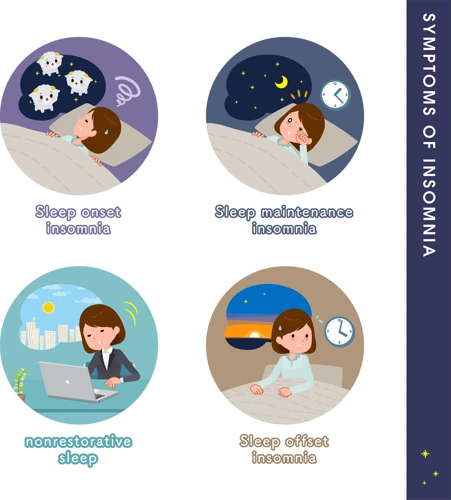
One of the types of insomnia that affects a significant number of people is the difficulty falling asleep or onset insomnia. This type of insomnia can be perplexing and frustrating to deal with, as it often results in staring at the ceiling for hours on end, unable to drift into a peaceful slumber. Understanding the symptoms and treatment options for onset insomnia can help those who suffer from it to seek the proper help and improve their sleep patterns.
Symptoms
When it comes to insomnia, the symptoms can vary depending on the type. Here are the symptoms associated with each type of insomnia:
| Insomnia Type | Symptoms |
|---|---|
| Acute Insomnia | The primary symptom of acute insomnia is difficulty falling asleep or staying asleep. This can lead to fatigue, daytime sleepiness, mood changes, difficulty concentrating or remembering things, and irritability. |
| Chronic Insomnia | Chronic insomnia shares the same symptoms as acute insomnia, but they last for at least 3 nights a week for 3 months or longer. Long-term sleep deprivation can lead to additional symptoms, such as depression and anxiety. |
| Onset Insomnia | This type of insomnia is characterized by difficulty falling asleep at the beginning of the night. Often, people with onset insomnia will try to go to bed at a reasonable hour, but find themselves tossing and turning for hours before finally falling asleep. |
| Maintenance Insomnia | People with maintenance insomnia have no trouble falling asleep, but they wake up frequently throughout the night and have difficulty falling back asleep. This leads to the same symptoms as acute insomnia, such as fatigue and daytime sleepiness. |
| Comorbid Insomnia | Comorbid insomnia is insomnia that is associated with another medical or mental health condition. The symptoms of comorbid insomnia are similar to those of acute and chronic insomnia, but they are often exacerbated by the additional condition. |
| Psychophysiological Insomnia | The symptoms of psychophysiological insomnia are similar to those of onset and maintenance insomnia. However, people with psychophysiological insomnia often associate their bed or bedroom with being awake and alert, which can create a cycle of anxiety and insomnia. |
If you are experiencing any of these symptoms, it may be helpful to talk to a healthcare professional about finding the right type of treatment for your condition.
Treatment
The most common methods for treating insomnia vary depending on the type of insomnia a person is experiencing. Below is a table summarizing the different treatments for each type of insomnia:
| Type of Insomnia | Treatment |
|---|---|
| Acute | Identify and treat any underlying causes, such as stress or illness. Short-term use of sleep aids may also be recommended. |
| Chronic | Cognitive behavioral therapy (CBT) is often recommended, which involves identifying and changing negative thought patterns and behaviors related to sleep. Prescription sleep medications may also be prescribed for short-term use. |
| Onset | Develop a consistent sleep routine, such as going to bed at the same time every night and avoiding stimulating activities before bed. Relaxation techniques and sleep aids may also be recommended. |
| Maintenance | Address any underlying medical issues that may be causing the insomnia, such as sleep apnea or restless leg syndrome. Modifying sleep environment and bedtime routine may also help. |
| Comorbid | Treating the underlying condition that is contributing to the insomnia is key. Cognitive behavioral therapy (CBT) may also be recommended to address negative thought patterns and behaviors related to sleep. |
| Psychophysiological | Cognitive behavioral therapy (CBT) is often recommended, which includes relaxation techniques and addressing negative thought patterns and behaviors related to sleep. Sleep restriction therapy may also be used. |
It is important to note that prescription sleep medications should only be used short-term, as they can be habit forming and have potential side effects. Additionally, natural remedies such as herbal supplements or acupuncture may be helpful for some individuals, but should be discussed with a healthcare professional before use.
Maintenance Insomnia
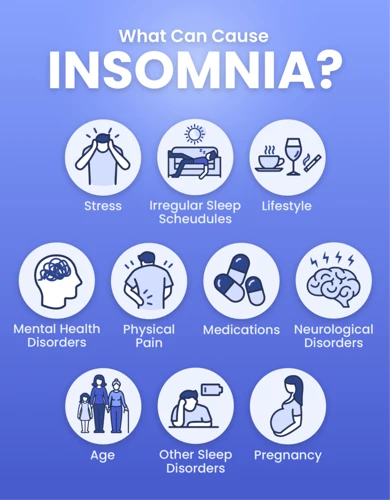
Maintaining healthy sleeping habits is important for overall well-being, but for some individuals, it can be a never-ending struggle. Many people experience Maintenance Insomnia, a type of sleep disorder in which they face difficulty staying asleep. This can lead to a significant impact on daily life as the individual fails to achieve restful sleep. Let’s delve deeper into the Symptoms and Treatment of this type of insomnia.
Symptoms
When it comes to different types of insomnia, each one has its own unique set of symptoms that can help with diagnosis and treatment. Here is a breakdown of the symptoms associated with each type of insomnia:
- Acute Insomnia: Symptoms of acute insomnia typically include difficulty falling asleep, frequent awakenings during the night, waking up too early, and feeling tired or not well-rested during the day.
- Chronic Insomnia: Chronic insomnia is characterized by symptoms that last for at least three months. These symptoms may include difficulty falling asleep, frequent awakenings during the night, waking up too early, feeling tired or not well-rested during the day, difficulty concentrating, and irritability.
- Onset Insomnia: With onset insomnia, the main symptom is difficulty falling asleep, which can lead to increased anxiety and frustration around bedtime. Other symptoms may include fatigue, difficulty concentrating, and irritability.
- Maintenance Insomnia: Maintenance insomnia is characterized by difficulty staying asleep throughout the night, often involving frequent awakenings or waking up too early. Other symptoms may include fatigue, difficulty concentrating, and irritability during the day.
- Comorbid Insomnia: Comorbid insomnia is when insomnia occurs alongside another medical or mental health condition, such as anxiety, depression, or chronic pain. Symptoms may include difficulty falling or staying asleep, as well as symptoms related to the underlying condition.
- Psychophysiological Insomnia: This type of insomnia is often related to prolonged periods of stress or anxiety, and is characterized by difficulty falling asleep as well as conditioned arousal, which means the person associates their bed with wakefulness rather than sleep. Other symptoms may include fatigue, difficulty concentrating, and irritability during the day.
It is important to note that these symptoms may vary from person to person and can overlap between different types of insomnia. If you are experiencing any of these symptoms, it is important to talk to a healthcare professional to determine the underlying cause of your insomnia and develop an appropriate treatment plan.
Treatment
Treatment for insomnia depends on the type and severity of the condition. Below are some common treatments:
- Lifestyle changes: This is the first and most basic way to treat insomnia. Good sleep hygiene can make a big difference, such as setting a regular sleep schedule, avoiding caffeine and alcohol, and creating a comfortable sleep environment.
- Medications: Over-the-counter and prescription medications can be used for short-term relief. Sedative-hypnotics such as benzodiazepines and non-benzodiazepine hypnotics may be prescribed by a healthcare provider.
- Behavioral therapy: Cognitive-behavioral therapy for insomnia (CBT-I) is a specific type of therapy that addresses the thoughts and behaviors that can interfere with sleep. This therapy may include relaxation techniques, sleep restriction therapy, and stimulus control therapy.
- Complementary therapies: Some people find relief through complementary therapies such as acupuncture, yoga, or mindfulness meditation. However, always consult with your healthcare provider before starting any new therapies or supplements.
- Treating underlying medical conditions: Finally, if an underlying medical condition is causing your insomnia, treating that condition may also help with sleep.
Remember that consistent, good quality sleep is vital for overall health and well-being. If you are struggling with insomnia, talk to a healthcare provider to discuss treatment options.
Comorbid Insomnia
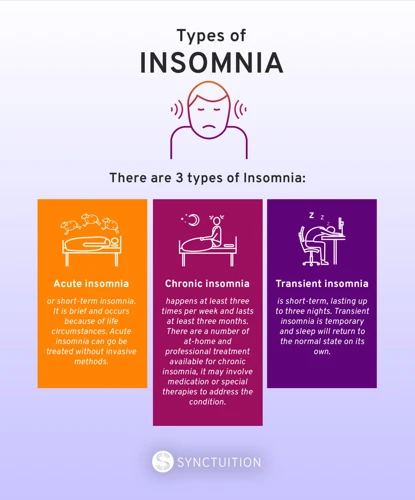
Individuals who suffer from sleep struggles often experience more than one type of sleep disorder at a time. This can make it difficult to pinpoint the exact cause of their insomnia. Comorbid insomnia is a type of sleep disorder that occurs when an individual is struggling with another medical or psychiatric condition while simultaneously experiencing insomnia symptoms. The complexity of this type of insomnia can make it challenging to treat and frustrating for those dealing with it. Let’s take a closer look at the symptoms and treatments for comorbid insomnia.
Symptoms
One of the most important aspects of understanding different types of insomnia is recognizing the symptoms associated with each type. Here are the symptoms associated with each type of insomnia:
| Type of Insomnia | Symptoms |
|---|---|
| Acute Insomnia | Difficulty falling asleep or staying asleep, typically lasting a few days to a few weeks. It can be caused by stress, changes to sleep environment, or physical discomfort. |
| Chronic Insomnia | Difficulty falling asleep or staying asleep that lasts for at least 3 months. It is often caused by underlying medical conditions or mental health disorders. |
| Onset Insomnia | Difficulty falling asleep at the beginning of the night. This type of insomnia is often caused by issues with the body’s natural sleep-wake cycle or poor sleep habits. |
| Maintenance Insomnia | Difficulty staying asleep throughout the night. People with this type of insomnia often wake up several times during the night and have trouble falling back asleep. It can be caused by medical conditions or mental health disorders. |
| Comorbid Insomnia | Difficulty falling asleep or staying asleep that is related to or caused by another medical or mental health disorder. For example, someone with depression may also have trouble sleeping. |
| Psychophysiological Insomnia | Difficulty falling asleep due to excessive worry or anxiety about not being able to sleep. This type of insomnia is often a result of negative associations with sleep and can be perpetuated by poor sleep habits. |
Recognizing the symptoms associated with each type of insomnia can be an important first step in identifying the underlying cause and seeking appropriate treatment.
Treatment
When it comes to treating various types of insomnia, there are many different approaches that can be taken. Here are some of the most common treatments for each type of insomnia:
Acute Insomnia Treatment:
- Identifying the underlying cause of the insomnia, such as stress or a recent traumatic event, and addressing it through therapy or counseling.
- Practicing good sleep hygiene, such as establishing a regular sleep schedule, avoiding caffeine and alcohol, and avoiding stimulating activities before bedtime.
- Using short-term sleep aids, such as over-the-counter or prescription medications, to help promote sleep in the short term. However, it is important to use these medications only as directed and under the guidance of a healthcare professional.
Chronic Insomnia Treatment:
- Oftentimes, treating chronic insomnia requires addressing underlying issues, such as chronic pain, depression or anxiety, through a combination of medication and therapy.
- Practicing good sleep hygiene can also help improve symptoms of chronic insomnia, alongside other lifestyle changes, such as exercise and diet modifications.
- Cognitive-behavioral therapy (CBT) has proven to be an effective treatment for chronic insomnia, as it helps individuals identify and replace negative thoughts and behaviors that contribute to insomnia.
Onset Insomnia Treatment:
- Practicing relaxation techniques, such as deep breathing or progressive muscle relaxation, to help reduce stress and anxiety that may be contributing to difficulty falling asleep.
- Ensuring proper sleep hygiene by establishing a regular sleep schedule, avoiding stimulating activities before bedtime and practicing relaxation techniques can also be effective in treating onset insomnia.
Maintenance Insomnia Treatment:
- Identifying and treating underlying medical conditions or other issues, such as chronic pain, that may be contributing to disrupted sleep patterns.
- Behavioral interventions such as stimulus control, which involves removing stimulating activities from the bedroom and only using the bedroom for sleep and sex; and sleep restriction therapy, which involves gradually reducing the amount of time spent in bed until sleep efficiency improves.
Comorbid Insomnia Treatment:
- Treating underlying medical or psychiatric conditions that may be contributing to insomnia, such as depression or anxiety disorders.
- Practicing good sleep hygiene and using relaxation techniques as needed can also be helpful in treating comorbid insomnia.
Psychophysiological Insomnia Treatment:
- Cognitive-behavioral therapy (CBT) has been found to be particularly effective for treating psychophysiological insomnia, as it helps target negative thoughts and behaviors that contribute to the condition.
- Relaxation techniques and good sleep hygiene practices can also help alleviate symptoms of psychophysiological insomnia.
Treatment for insomnia varies depending on the individual and the type of insomnia experienced. Working with a healthcare professional to determine the underlying cause of insomnia and develop a personalized treatment plan can help improve sleep and overall quality of life.
Psychophysiological Insomnia
One of the most common types of insomnia is often caused by a mix of psychological and physiological factors, leading to a frustrating cycle of sleeplessness. As a result, individuals who experience psychophysiological insomnia often find themselves feeling powerless and uncertain about how to escape the clutches of this complex condition. Let’s take a closer look at this type of insomnia and explore its symptoms and potential treatments.
Symptoms
Symptoms of different types of insomnia can vary. Here is a table of the symptoms commonly associated with each type of insomnia:
| Type of Insomnia | Symptoms |
|---|---|
| Acute Insomnia | – difficulty falling asleep – waking up frequently during the night – waking up too early and not being able to fall back asleep – feeling tired and/or irritable |
| Chronic Insomnia | – difficulty falling asleep or staying asleep for at least 3 nights per week for 3 months or longer – feeling tired and/or irritable – having trouble concentrating during the day – experiencing mood changes, like feeling depressed or anxious |
| Onset Insomnia | – difficulty falling asleep at the beginning of the night |
| Maintenance Insomnia | – waking up frequently during the night and having trouble falling back asleep – feeling tired and/or irritable during the day – experiencing mood changes, like feeling depressed or anxious |
| Comorbid Insomnia | – difficulty falling asleep or staying asleep due to an underlying medical condition – feeling tired and/or irritable during the day – experiencing mood changes, like feeling depressed or anxious |
| Psychophysiological Insomnia | – anxiety or worry about sleep that keeps you awake – experiencing tension or arousal while trying to fall asleep |
It is important to note that not all symptoms listed will be present for every individual with insomnia, and symptoms can vary in severity. If you are experiencing any of these symptoms, it is recommended to speak with a healthcare professional about possible treatment options.
Treatment
When it comes to treating insomnia, there is no one-size-fits-all solution. Treatment options can vary greatly depending on the specific type of insomnia and the root cause of the issue. Here are some common treatments for each type of insomnia:
Acute Insomnia:
- Identifying and addressing the underlying cause, such as stress or jet lag.
- Incorporating relaxation techniques like yoga or meditation into your daily routine.
- Taking over-the-counter sleep aids for a limited time under the guidance of a healthcare professional.
Chronic Insomnia:
- Cognitive Behavioral Therapy (CBT), which involves working with a therapist to identify and address negative thoughts or behaviors related to sleep.
- Making lifestyle changes, such as adopting a regular sleep schedule, limiting caffeine and alcohol consumption, and creating a comfortable sleep environment.
- Prescription medications, such as benzodiazepines or non-benzodiazepine hypnotics, though these are typically only recommended for short-term use.
Onset Insomnia:
- Creating a relaxing pre-sleep routine that can help signal to the body that it’s time to wind down and prepare for rest.
- Avoiding stimulating activities and substances before bed, such as exercise or caffeine.
- Taking prescription sleep medications, if necessary, under the guidance of a healthcare professional.
Maintenance Insomnia:
- Identifying and addressing underlying medical conditions that may be contributing to the issue.
- Sticking to a regular sleep schedule, even on weekends or days off.
- Taking prescription sleep medications, if necessary, under the guidance of a healthcare professional.
Comorbid Insomnia:
- Treating the underlying medical or psychological condition that is causing the insomnia, such as depression or chronic pain.
- Adopting healthy sleep habits, such as establishing a regular sleep schedule and avoiding stimulating activities before bed.
- Medications, such as antidepressants or anti-anxiety drugs, under the guidance of a healthcare professional.
Psychophysiological Insomnia:
- CBT, which can help address any negative thoughts or behaviors around sleep that may be contributing to the issue.
- Relaxation techniques, such as progressive muscle relaxation or deep breathing exercises.
- Prescription sleep aids, if necessary, under the guidance of a healthcare professional.
It’s important to consult with a healthcare professional if you are experiencing chronic or severe insomnia. They can help create a treatment plan tailored to your specific needs and underlying causes of the issue.
Conclusion
After exploring the different types of insomnia and their respective symptoms and treatments, it is clear that there is no one-size-fits-all solution for this sleep disorder. It is important for individuals who have difficulty sleeping to seek medical advice and to be properly diagnosed with the type of insomnia they are experiencing.
Acute insomnia is usually caused by temporary stressors and can be resolved by addressing the root cause, whereas chronic insomnia requires a more holistic approach for treatment. Onset insomnia may require necessary lifestyle modifications and sleep hygiene practices, while maintenance insomnia may require a closer examination of medications and underlying medical conditions. Comorbid insomnia is complex as it typically involves multiple medical or psychiatric conditions, and psychophysiological insomnia requires psychological intervention.
It is important to understand that insomnia can have a significant impact on an individual’s mental health, physical health, and overall quality of life. It is not a condition that should be brushed aside or ignored. By seeking proper medical attention and exploring the various types of treatments available, individuals can work towards improving their sleep and reducing the negative impact that insomnia can have on their daily life.
Frequently Asked Questions
What is insomnia?
Insomnia is a sleep disorder characterized by difficulty falling asleep or staying asleep, or waking up too early and not being able to fall back asleep.
What are the main types of insomnia?
The main types of insomnia are acute, chronic, onset, maintenance, comorbid, and psychophysiological.
What causes insomnia?
Insomnia can be caused by a variety of factors, including stress, anxiety, depression, medical conditions, medications, and lifestyle habits.
How is acute insomnia different from chronic insomnia?
Acute insomnia is short-term, lasting a few days to a few weeks, while chronic insomnia lasts at least three nights a week for three months or longer.
What are some common symptoms of insomnia?
Common symptoms of insomnia include difficulty falling asleep, difficulty staying asleep, waking up too early, feeling tired upon waking, irritability, and difficulty concentrating.
Which types of insomnia are more likely to be caused by psychological factors?
Comorbid and psychophysiological insomnia are more likely to be caused by psychological factors such as anxiety, depression, and stress.
How can cognitive behavioral therapy help treat insomnia?
Cognitive behavioral therapy for insomnia (CBT-I) is a type of talk therapy that helps individuals address the thoughts and behaviors that contribute to insomnia, and develop new strategies to improve sleep.
What are some lifestyle changes that can help improve insomnia?
Lifestyle changes that can help improve insomnia include establishing a regular sleep schedule, avoiding caffeine and alcohol, exercising regularly, and creating a comfortable sleep environment.
When should I see a doctor for my insomnia?
If you experience persistent difficulty falling or staying asleep, or if your insomnia is affecting your daily life and well-being, it’s important to talk to your doctor. They can help diagnose any underlying medical or psychological conditions that may be contributing to your insomnia, and recommend appropriate treatments.
Can medication be used to treat insomnia?
Yes, medication can be used to treat insomnia, but it should be used under the guidance of a healthcare professional. Some medications used to treat insomnia include benzodiazepines, nonbenzodiazepine hypnotics, and melatonin receptor agonists.

